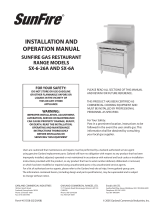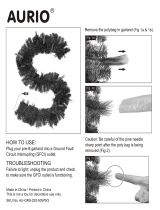
Page 14
Cleaning
Griddle
To produce evenly cooked, browned griddle products, keep
griddle free from carbonized grease. Carbonized grease on
the surface hinders the transfer of heat from the griddle
surface to food product. This results in uneven browning
and loss of cooking eciency, and worst of all, carbonized
grease tends to cling to grilled foods, giving them a highly
unsatisfactory and unappetizing appearance. To keep the
griddle clean and operating at peak performance, follow
these simple instructions:
a. AFTER EACH USE clean griddle thoroughly with a
grill scraper or spatula. Wipe o any excess debris
left from cooking process.
b. ONCE A DAY clean griddle surface with a grill brick
and grill pad. Remove grease container and clean
thoroughly, in the same manner as any ordinary
cooking utensil.
c. ONCE A WEEK clean griddle surface thoroughly.
If necessary, use a grill stone or grill pad over the
griddle surface. Rub with grain of the metal while
still warm. A detergent may be used on the plate
surface to help clean it, but care must be taken to
be sure it is thoroughly removed. After removal of
detergent, the surface of the plate should be covered
with a thin lm of oil to prevent rusting. To remove
discolorations, use a non-abrasive cleaner. Before re-
using, the griddle must be reseasoned. Keep griddle
drain tube to grease container clear at all times.
CAUTION: This griddle plate is steel, but the surface is
relatively soft and can be scored or dented by careless use
of spatula. Be careful not to dent, scratch, or gouge the plate
surface. This will cause food to stick in those areas. Also, note,
since this is a steel griddle if a light coating of oil is not always
present rust will develop on exposed and uncoated areas.
Open Top Burners
Cleaning of the open top burner is a simple procedure,
and, if done at regular intervals, will prolong the life of the
appliance and ensure good ame characteristics.
1. The most common problem with open burners is
spillage. Once the burner ports are partially plugged with
food, the air-to-gas mixture is disturbed and results in an
inecient burner.
2. Wipe any spills as they occur.
3. Top grates and trays should be removed daily, washed,
rinsed and dried thoroughly.
4. Use a wire brush to clean the ports of the burners. Ignite
and check for clogged holes.
5. If any clogged holes are apparent, the burner should be
lifted out and brushed inside and out with a small Venturi
brush. Each port on the burner itself should be cleaned
with a properly sized wire or thumb drill. Wash with soap
and hot water if grease is observed on the burners. Dry
thoroughly.
6. When reinstalling the open top burner head be sure
the burner ports are lined up correctly to the pilot. On
the cast burner head there is a raised-arrow indicator to
ensure the burner is installed correctly.
RAISED ARROW INDICATOR
PILOT
7. If an abnormal ame appears around the edges, it is
usually a sign of grease or dirt in the throat of the burner.
Remove the burner venturi (main body that the burner
heads sit on) to access the air shutter opening. Remove
grease and dirt from the air shutter area carefully. Do
not adjust the shutter setting. The air shutter allows the
proper amount of air to mix with the ow of gas coming
in from your valve/thermostat orice and should not be
adjusted unless by a licensed gas tter technician.
ABOUT STEPUP HOT PLATE BURNERS: The step up cast
burner housing is assembled at the factory with two locating
pins to ensure that the housing can only be installed in the
correct positions should they be removed for cleaning. One
pin is located on the top of the housing to ensure the burner
head is oriented correctly when installed so that the lighter
nger is correctly pointing at the pilot ame. The second is
located on the housing bottom and must t into the slot on
the burner support, otherwise the burner will not be stable.
Cast Iron Top Grates
Cast iron top grate(s) can be cleaned with mild soap and
warm water. For baked on material, a wire brush can be
used. Dry thoroughly. Lightly coat with vegetable oil to help
prevent rust from forming.
MAINTENANCE & CLEANING
Part # 4528529 Rev. 1 (11/03/11)



















